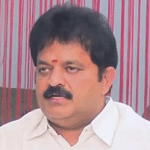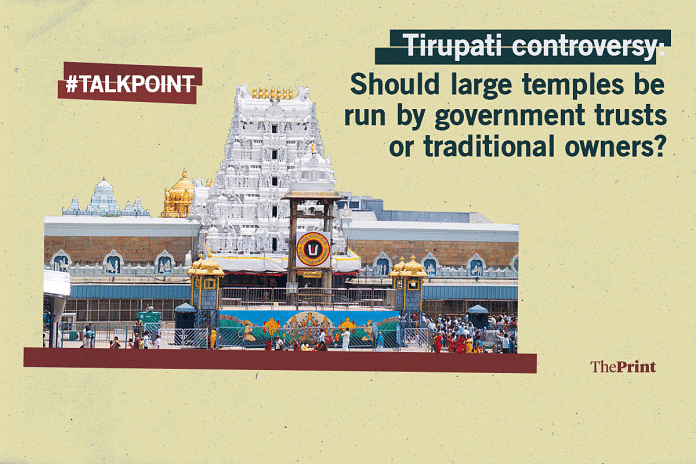AV Ramana Dikshitulu, the former head priest of India’s richest temple, Tirumala Tirupati Devasthanams, has accused the state-run trust of corruption and demanded an open audit of the temple’s riches. Protesting against the head priest’s removal, several groups are demanding a probe into the damning allegations made by him.
Jaganmohan Reddy, leader of the opposition in Andhra Pradesh, has called the Tirupati trust an ‘epicentre of corruption.’
ThePrint asks: Tirupati controversy: Should large temples be run by government trusts or traditional owners?
Better to leave temples alone if properly managed and audited
 Dr. Karan Singh
Dr. Karan Singh
Former Rajya Sabha MP, and son of Maharaja Hari Singh, last Dogra king of Jammu and Kashmir
The whole question of central or state governments taking over temples is a vexed one. On one hand, it is generally better to leave the temples alone provided they are properly managed and their accounts regularly audited. The two circumstances in which government should intervene are: first, if there is gross and visible corruption and mismanagement by sub-standard trusts, and second, when the pilgrimages or places of worship are too massive to be run by a private trust, such as the Vaishno Devi and Amarnath yatra in Jammu and Kashmir, and the Kashi Vishwanath Temple in Varanasi.
Even in such cases, it is important to have an advisory group of concerned citizens, who are devout believers and can give advice on better management of the temples. To leave the matter purely in the hands of officials is not correct, because the concerned officers may or may not happen to be religious-minded. It is also important that in the event of the government taking over a temple, its net revenues should be ploughed back into improving the facilities in the temple, especially public health facilities.
Cleanliness is something which is immensely important, and here the south Indian temples seem to perform much better than those in the North. For example, I happened to visit the Kalkaji temple in Delhi some years ago and found the shrine swarming with flies and other insects, and the whole area in a state of disrepair. This leaves a negative impression on visitors and devotees. The Sikh gurdwaras present a marked contrast. They are meticulously clean, mainly due to the voluntary service offered by members of the community. Regretfully, in Hindu temples the concept of kar sewa has not caught on.
TTD has become a place for unemployed or retired government officials to make money
 Naveen Kumar Reddy
Naveen Kumar Reddy
Convener, Rayalaseema Porata Samithi – the group protesting about the safety of the jewels in Tirupati
The temple chief priest at the Tirumala Tirupati Devasthanams (TTD) has alleged that the pink diamond was misplaced and he even identified it when he saw the auction at Geneva. We are extremely saddened by the way things have happened and we seek an immediate CBI inquiry into the matter. I do agree that if the temples are handed over to traditional families, they will be in a better position to manage the situation. Why can’t the TTD appoint some traditional family members to the board?
As of now, TTD has become a place for unemployed or retired government officials to make money. Every new government that comes to power appoints their preferred person as TTD chairman who then sits down to make money. I make this allegation knowingly that the ‘seva’ tickets which cost Rs 500 are sold at Rs 5,000 by these politicians.
As for the jewels, we are not asking for an exhibition of the jewels. We are saying that ‘use the channel that is run by TTD, SVBC to show people the jewels every year. This way, people will know what their temple has, and they will be convinced that there is no wrongdoing. I am a devotee, and I know which jewels will adorn the Lord on which auspicious day. For example, I know which jewels Lord Venkateshwara would wear for Garuda Seva.
The executive officer, chief accounts officer and the financial accountant are responsible for any irregularities reported inside the temple and they should be made accountable.
But, I will again reiterate that traditional families, Hindu organisations, and long-time devotees are ready to take up the responsibility and TTD should welcome it.
Tirupati has the best temple administration in the country. All donations are audited
 Kanumuri Bapi Raju
Kanumuri Bapi Raju
Former chairman, Tirumala Tirupati Devasthanams
The existing system is alright and there is no problem at all. I was the chairman during the last three years, and before that I held the position in 1999 too.
I feel Tirumala Tirupati Devasthanams (TTD) has the best possible administration that any temple can boast of. The temple is well-maintained. Being run by a trust, and not traditional owners, ensures that the temple is not exploited commercially as per any one person’s whims and fancies.
The temple budget passed by the board is ratified by the government of Andhra Pradesh. The temple records are audited and everything, including the number of ornaments, is listed. For any offering to the God, a prior permission is sought from the temple authorities.
When Gali Janardhana Reddy offered a keeridam (crown) worth Rs 40-50 crore, he had sought prior permission from the executive officer. Offerings to the Hundi, which do not need prior permission, are also separately assessed by a committee.
The head of the department, Balaji, is an honest person. I know the priest who has levelled allegations of financial irregularities at TTD as he was there when I was the chairman. I have great respect for him, but I am shocked by his statement. I have known him well, and I feel he could have walked up to me and told me about his concerns.
Temples must remain with traditional families or govt appointee should be a true ‘bhaktha’
 Aditya Varma
Aditya Varma
Member, erstwhile Travancore royal family
Yes, temple ownership must remain with the traditional families. You take account of all the temples that have been given to the government and see what was there when it was given to the government and then make a list of how many things are there now. Who do you think is answerable? You will get the answer. Nobody knows what comes and goes.
People who handle the temple should know about the rituals and the customs. We are Padmanabha daasas. Since I was a year old, I have been a servant of god. My family’s umbilical cord is tied with Lord Padmanabha. The traditional families understand the importance of the temple and its sanctity. That is why it should not go into an outsider’s hands.
If a temple is under a government, they should ensure transparency and take responsibility for everything that happens. Our family, who have been daasas of the temple, have kept an account of everything. There are nearly 60 cameras in and around the Padmanabha temple to keep a close watch on all the happenings.
If a temple is under the government, the employee who oversees it should be a true bhaktha, a devoted person. Only then, things will fall in place, and transparency can be ensured.
Govt control over temple trusts can ensure accountability & transparency
 Manisha Kayande
Manisha Kayande
Shiv Sena leader and member on the board of trustees of the Sri Saibaba Sansthan Trust, Shirdi
There are many aspects to this, but I believe there should be some government control on large religious institutions to keep a check on corruption, amassing of funds, money laundering and to ensure easy access to the public.
When the government is watching, people running the trust have some sense of accountability. For example, all members on the board of the Shirdi Sansthan Trust are government nominees, and as a result, there is transparency in the administration and management, and the functioning is more democratic. Documents are open to scrutiny under the Right to Information Act.
In the absence of this, one will never know exactly what is happening with the temple donations, and may give rise to corruption.
The Maharashtra government took over the management of the Shirdi temple precisely for this reason as there were allegations of misappropriation and neglect.
Having said that, government control over large temple trusts also opens the way for political interference. The government’s nominees to the position of trustees are mostly politicians. It is an open secret that these posts are given to members of the ruling parties, whether it is with the Shirdi Sansthan or the Siddhivinayak Trust.
But overall, it is good to have government control to ensure accountability and transparency.
We should also consider a similar move for major places of worship of other religions. I agree that India is a majority Hindu nation and donations to temples may be much higher, but there are institutions among other religions too which are flush with funds.
SGPC shifted gurudwaras from a vice-ridden mahant system to a democratic one
 Roop Singh
Roop Singh
Secretary, Shiromani Gurudwara Prabandhak Committee, Amritsar
Without commenting on the specifics of the current controversy, I would give the example of the Shiromani Gurdwara Parbandhak Committee (SGPC). It is an independent, elected body of Sikhs whose prime responsibility is to manage and run the Golden Temple as well as the other gurdwaras.
Before SGPC came into being in the 1920s, gurdwaras were controlled by mahants—a hereditary system which had over the years fallen prey to all sorts of vices. After a protracted struggle of five years, the Gurdwaras Act of 1925 was passed, ending the mahant system. The control of the gurdwaras was shifted from a hereditary set-up to a community based democratic set-up.
SGPC was, in fact, a first-of-its-kind organization that was established during the British era. SGPC members from across the state are elected by an electorate of the Sikhs, male and female, above 18 years of age, who are registered as voters under the Act. The elections to SGPC are held after every five years. The executive body and office-bearers are then chosen. Apart from management of gurdwaras, SGPC runs several prestigious educational institutions, including medical colleges, hospitals and charitable trusts. It’s functioning is transparent. A monthly magazine ‘Gurdwara Gazette’ is published by SGPC which gives details of the accounts maintained by it. This is being published regularly since 1927.
Punjab government also conducts an annual audit of SGPC accounts. Our annual budget provides details of how SGPC money is being spent.
State-managed southern temples cleaner & better-run than privately owned northern ones
 Jaithirth Rao
Jaithirth Rao
Entrepreneur and writer
In peninsular India, major temples were never “privately owned”. Temples were controlled by kings. Mysore had its Muzrai department; Travancore and Cochin had Devaswom boards. State institutions were in-charge. When the East India Company donned the mantle of a Raja, the “management” of the Tirumala-Tirupati temples became the company’s responsibility. But, in London, Christian-extremist evangelicals “agitated” that it was not appropriate for a British institution to patronise idolatrous, heathen, pagan houses of worship. The agents in Madras “handed over” the administration of the Tirupati temples to a north Indian family of devotees.
In the 1920s, in the limited-franchise elections held under the Montagu-Chelmsford Reforms, the Justice Party, known for its anti-Brahmin and possibly anti-north Indian credentials, came to power. One of the first acts of this government was to take control of the management of important Hindu temples under the Hindu Religious and Charitable Endowments (HRCE) Board. The influence of Brahmins was curtailed. The same government created the Tirumala Tirupati Devasthanams Board under a non-Brahmin chairman. HRCE and TTD functioned in a manner similar to Muzrai and Devaswom establishments, controlled by non-Brahmin rajas. Finances and administration came under their purview while rituals were left untouched.
Government control has been, on balance, good. Southern Hindu temples are cleaner, better-managed than privately owned, chaotic temples in the north. Apparently, state intervention has improved things at Vaishno Devi.
To make a libertarian argument that Hindu temples should be “set free” from state interference betrays a lack of knowledge about the relationship between the state, temples and Hindu society.
Temples are gold mines politicians can’t let go
 Ratan Sharda
Ratan Sharda
Author, Secrets of RSS: Demystifying The Sangh, and columnist
Most ancient temples in India were built by kings and dedicated to their ‘aradhya daivat’ or presiding deity. They never claimed ownership of the temples, nor put their names on them. They dedicated the temples to the people in their kingdom to be run as public institutions.
This is why governments post-Independence found it easy to take over the temples. They cited mismanagement as the ground for such takeovers. Nothing can be farther from truth because barring a few exceptions, most temples were run efficiently. Unfortunately, laws made to help minorities run their institutions to nurture their culture and faith somehow turned into anti-majority laws wherein the majority couldn’t run their institutions.
Politicians cannot let go of a gold mine. These temples have become a playground for them through government appointees.
The best way would be to have a national temple management committee on the lines of the Shiromani Gurdwara Parbandhak Committee at the centre with governing councils at the state level. The committee should be made up of people who respect the Hindu belief system.
Government must leave Hindu temples and institutions alone just the way it has done in the case of institutions run by minority communities. Such a step would be just to Hindus and exemplify true secularism.
Compiled by Rohini Swamy, Manasi Phadke and Chitleen K. Sethi.



